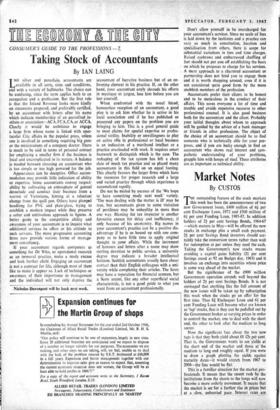Taking Stock of Accountants
`TH IDONONV VA GOIT
CONSUMER S GUIDE TO THE PROFESSIONS —Z
By IAN LAING
LT IKE silver and porcelain, accountants are available in all sorts, sizes and conditions, and with a variety of hallmarks. The choice can be confusing, since the term applies both to an occupation and a profession. But the first rule is that the Inland Revenue looks more kindly on statements prepared, and preferably certified, by an accountant with letters after his name which indicate membership of an accredited in- stitute or association—ACA, FCA, CA, or ACCA. Clearly it would be ambitious to engage a large firm whose name is linked with spec- tacular City affairs in the popular press, unless one is involved in something requiring big guns or the ministrations of a company doctor. There is much to be said in terms of personal contact for employing a smaller firm if the business is local and uncomplicated in its nature. A balance is needed between choosing an accountant who is too simple or too high powered for the job.
Appearances can be deceptive. Office accom- modation may provide little indication of ability or expertise. Some accountants convey respect- ability by cultivating an atmosphere of genteel desuetude and conduct their business from a warren of Victoriana, hinting at a reluctant change from the quill pen. Others have plunged headlong for PVC and plate-glass, trying to establish a modern impact while they preserve a sober and unfrivolous approach to figures. A better guide to the competitive ability and awareness of your accountant is to inquire what additional services he offers or his attitude to such services. The more progressive accounting firms now provide various forms of manage- ment consultancy.
If your accountant regards computers as something for Dr Who, or operational research as an immoral practice, make a ready excuse and look further afield. Engaging an accountant is not a contract for life, although most of them like to make it appear so. Lack of techniques or awareness of their importance to management and the individual will not only deprive the Nicholas Davenport will be back next week. accountant of lucrative business but of an en- livening element in his practice. If, on the other hand, your accountant coyly shrouds his efforts in mystique or jargon, lose him before you are lost yourself.
When confronted with the usual bland, humourless reception of an accountant, a good ploy is to ask him whether he is active in his local association and if he has published or presented any papers on the problem you are bringing to him. This is a good general guide to most claims for special expertise or profes- sional virility. Inability or unwillingness to play an active role in professional or local business is an indication of a moribund intellect or a practice overloaded with work. It requires smart footwork to distinguish which is the case. The reshaping of the tax system has left a clean slate of much tax practice and so placed many accountants in this field on an equal footing. This clearly favours the larger firms which have the resources for proper research and a large and varied practice through which experience is accumulated rapidly.
Do not be misled by excuses of the 'We hope to have something ready next week' variety. `The man dealing with the matter is ill' may be true, but accountants given to some visitation of pestilence may be unhealthy in more than one way. Blaming the tax inspector is another favourite excuse for delay and inefficiency, if only because of his anonymity. Big names in your accountant's practice can be a positive dis- advantage if he is so bound up with one com- pany as to have little time to apply original thought to your affairs. While the increment of honours and letters after a name may show sterling devotion to public service, a university degree may indicate a broader intellectual horizon. Scottish accountants usually have closer contact than their English colleagues with a uni- versity while completing their articles. The Scots may have a reputation for financial acumen, but a Scots accent, like any other superficial social characteristic, is not a good guide to what you want from an accountant professionally. Don't allow yourself to be overcharged for your accountant's services. Since no scale of fees is laid down by the institutes and a practice can vary so much in constitution, location and specialisation from others, there is scope for substantial variations in fees and time charges. Raised eyebrows and embarrassed shuffling of feet should not put you off establishing the basis on which he proposes to charge for his services. A mere approach to a chartered accountant or partnership does not bind you to engage them and it is worth shopping around, even if it is not considered quite good form by the more snobbish members of the profession.
Accountants prefer their clients to be honest and to be meticulous in the conduct of their affairs. This saves everyone a lot of time and trouble and avoids expensive recourse to other professional counsel. It is also good business both for the accountant and the client. Probably your initial thoughts about whom to approach will be guided by the advice of a bank manager or friends in other professions. The object of the choice of an accountant should be to find someone who is technically able for your pur- poses, and if you are lucky enough to find an accountant who shows real interest and sym- pathetic understanding of your problems, grapple him with hoops of steel. These attributes are as important as technical ability.






























 Previous page
Previous page